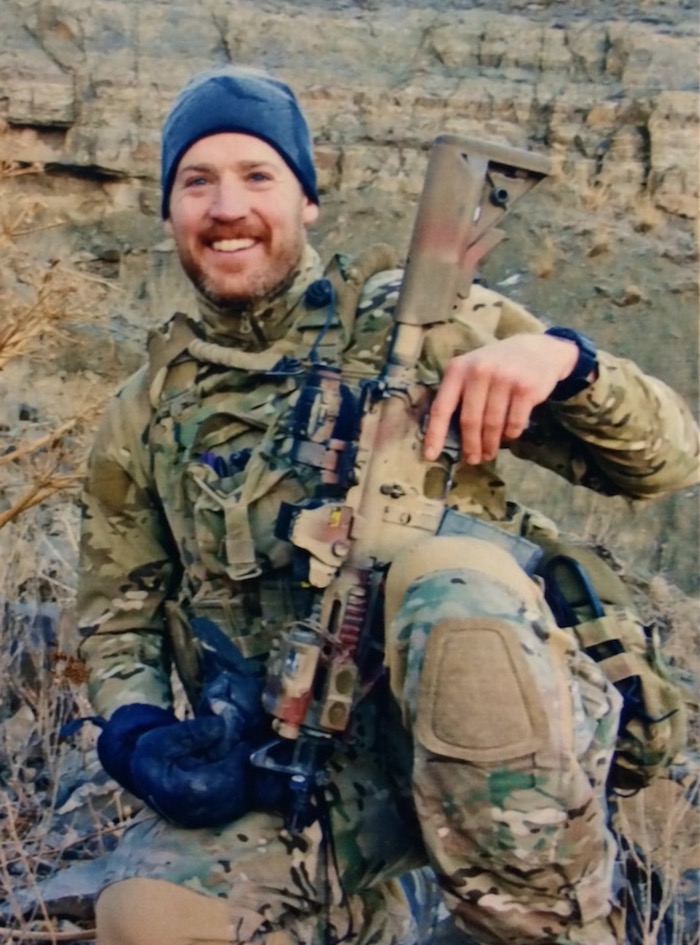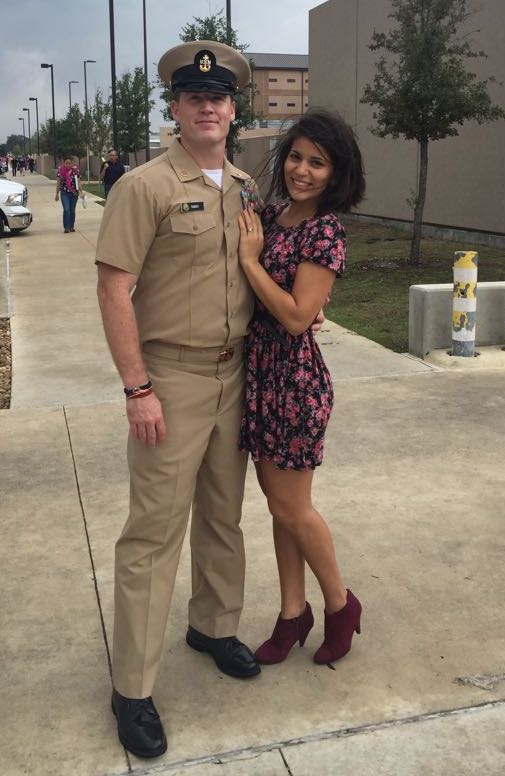
Online and on duty: Navy weapons tech specialist earns an engineering degree
Schools days for Carl Harris have not been the same typical routine experience they are for most college students.
Throughout much of the past four years while he listened to lectures, studied, did homework, took tests and completed class projects, Harris was not only on active duty in the U.S. military but often deployed overseas in regions enmeshed in some of the most intense conflicts in the world.
With his deployments having recently ended, his next mission is to Arizona State University to attend the graduation ceremony at which he will receive the bachelor’s degree he earned through the online Engineering Management program in ASU’s Ira A. Fulton Schools of Engineering.

Carl Harris has been on active duty or reserve status for the U.S. Navy for the past 18 years, with multiple deployments on missions in countries throughout the Middle East. He says he may stay associated with the military as a contractor as he begins a new career after earning an engineering degree online from the Ira A. Fulton Schools of Engineering. Photo courtesy of Carl Harris.
The distance-learning opportunity enabled Harris to do classwork throughout his time in the Middle East — sometimes while in active battle zones — pursuing his higher educational goals in the off-hours from his job for the U.S. Navy as an explosive ordnance disposal, or EOD, technician.
Despite the potential dangers, “not every day was all that intense,” Harris admits, not wanting to overdramatize the situation. There were days, in fact, when the toughest challenge he recalls facing was calculus homework.
Developing combination of technical and investigative skillsets
Since enlisting in 2001 at age 21, Harris has been involved in Navy expeditionary operations or in training in Iraq, Afghanistan, Syria, Qatar, Kuwait, Bahrain and the United Arab Emirates, at times in support of other branches of the military or coalitions of U.S. military special forces and federal government entities such as the Drug Enforcement Administration.
About six years into his military career he got into work that has since evolved into a high-tech investigative specialty and led him to become a member of a Navy Combined Explosives Exploitation Cell, known as CEXC.
The job entails much more than simply defusing IEDs — improvised explosive devices — and similar weaponry that has been widely used by enemy forces and terrorist groups in the conflicts in Iraq, Afghanistan and elsewhere.
As Harris explains it, the military years ago “began to figure out that it was smarter not to blow all that stuff up,” and that the people who make, deliver and plant those devices “leave biometric data on them that allow us to uncover and attack IED networks.”
Along with the explosive materials, CEXC technicians take cell phones, computers and other data storage and communications technologies they find or confiscate to special labs for forensic investigations that can identify fingerprints, traces of DNA or various chemical and materials residues on the devices, as well as provide valuable electronic data.
The information, Harris says, “can sometimes tell us where these things came from, who made them and who placed them,” and might even lead to identifying individuals who were involved.
Using military expertise as basis for engineering capstone project
Harris’ expertise in the field got him employment as an advisor to the United Arab Emirates military during three years when he was on reserve status. His experience also provided a unique focus for the senior-year capstone engineering design project required for his ASU studies.
To fulfill that assignment, Harris assembled a “flyaway kit” designed to enable EOD technicians to strategically prepare the technologies and other gear necessary to carry out specific types of missions.
The kit had to meet various military operational specifications, be easily transportable, cost-effective and provide all the equipment necessary to support at least three to four separate missions to multiple locations.
The project culminated with the establishment of a formalized flyaway kit for future deployments of Combined Explosives Exploitation platoons.
Navy experience provided confidence to pursue engineering degree
Dozens of Fulton Schools online engineering management students have been enrolled while on active military duty, but few if any have spent as much time in combat environments while completing coursework, says Fulton Schools Professor of Practice Daniel McCarville, one of the Industrial Engineering program faculty members who teach engineering management courses.
“I can’t imagine how anyone completes so much work for a college engineering degree in some of the world’s most devastated and hostile areas,” McCarville says of Harris. “Maybe after doing a job in those kinds of places, doing schoolwork is just good stress relief.”
Harris, a recipient of the Bronze Star for meritorious achievements in the military, says his experiences with the country’s armed forces are what gave him confidence that he had the leadership, project coordination and technical problem-solving abilities to pursue an engineering management career.
Harris credits McCarville in particular for making extra efforts to find technical solutions that enabled him to stay connected to the online instruction sessions even when he was stationed in remote areas with little or no internet connection.
Getting the benefit of professors’ industry knowledge
When he decided to pursue the degree, Harris says he searched for a university that had not only good online programs but a reputation among industry leaders for producing capable engineers.
“ASU was the perfect place for both of those things,” he says. “Going to college with the breadth of experience I gained from the military, I can, in most cases, recognize competence. And what I loved about ASU was that almost all of my instructors have honed their craft through their work out in the field. They know the industry and they understand the corporate world.”
Harris’ degree comes with a minor in sustainability, and he says ASU’s School of Sustainability also proved to be a good choice for those studies.
“I am a big fan of the whole sustainability movement,” he says. “Sustainable technologies are going to be a big emerging market around the world. I would love to work in engineering management at a cutting-edge sustainable tech company.”

Carl Harris hopes to have his wife, Isabella (pictured), his parents and sister with him when he travels to Arizona State University to receive a degree in engineering management. Photo courtesy of Carl Harris.
Online students’ job prospects are on upswing
Based on the trends for graduates of ASU’s engineering online programs, Harris’ degree should boost his chances of fulfilling such aspirations, according to McCarville and Associate Professor Rong Pan, who is chair of the engineering management program in the School of Computing, Informatics, and Decisions Systems Engineering in the Fulton Schools.
“Our online students are getting top jobs the same as our on-campus students,” McCarville says. “Some are leaving their current employers for much better opportunities because of their new engineering degree.”
Data analyzed by the Fulton Schools Career Center shows that ASU online engineering students are finding employment at as strong a rate — and in some fields at a higher rate — than traditional on-campus students.
The overall employment rate for Fulton Schools graduates is 85 percent. The employment rate for students in online programs is more than 5 percent higher.
Helping military vets and active personnel go to college
The employment rate may be one of the factors boosting growth of the online Engineering Management program, which started in 2012 as the first fully online undergraduate engineering degree program in the United States. It remains the only ABET-accredited fully online bachelor’s degree program in engineering management.
Eight students enrolled in the program in its first semester. Today there are 429. Forty-five students have now graduated. Fifteen of them are military veterans.
There are 55 students on active military duty currently in the program, and 73 military veterans. Pan and McCarville hope to see more.
“I think there are very few opportunities for people to earn an engineering degree while on active duty in the military. We want to do whatever we can to support them in becoming college graduates,” McCarville says.
Set to embark on multifaceted career
With his degree, Harris is exploring a number of career options. There are opportunities to work as a contractor with the military and to use his training in the Lean Six Sigma management methodology to offer his services as a business consultant.
For now, he has signed on to go to work soon after graduation for a private company that needs skills like those he applied in his Navy deployments as an EOD technician.
Harris, who plans to remain on reserve status for the foreseeable future, is also interested in mentoring others in the military about educational and career opportunities.
He says he wants to steer his fellow service members to universities like ASU “that are really committed to making people smarter and giving them a chance to earn a truly valuable degree.”



































